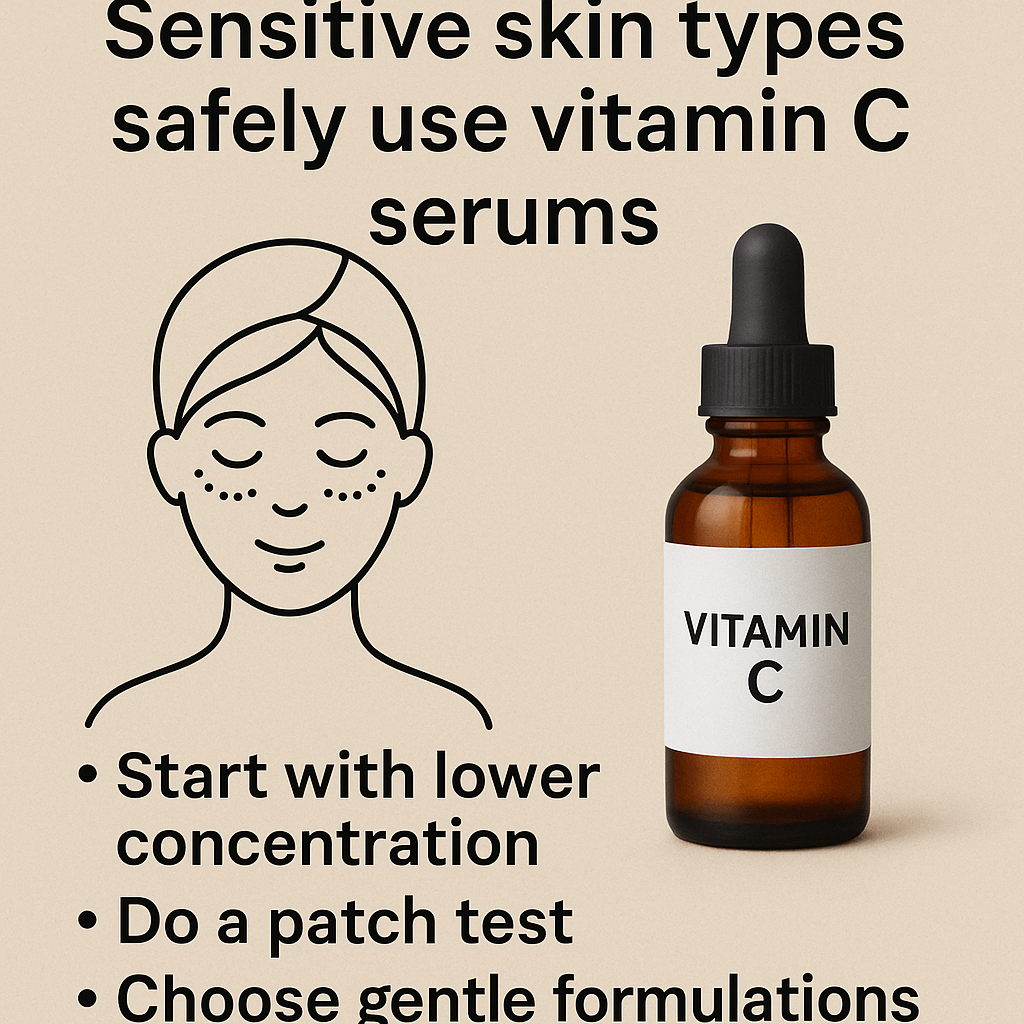Sensitive skin is both a blessing and a challenge—it often signals a naturally delicate complexion but also demands extra care, as it reacts easily to environmental triggers and harsh ingredients.. While it tends to age more gracefully than oily skin, it also reacts more easily to environmental changes, stress, and—yes—skincare products. One ingredient that sparks both curiosity and concern for those with sensitive skin is vitamin C. Known for its brightening, anti-aging, and antioxidant benefits, vitamin C serums have become a skincare staple. But the big question remains: Can sensitive skin types safely use vitamin C serums in 2025?
The answer is a resounding yes—if you choose wisely. In this comprehensive blog post, we will explore everything about vitamin C serum tailored specifically for sensitive skin: what to look for, how to use it, the best formulations in 2025, and how to avoid irritation while reaping the glow.
What Is Vitamin C Serum, and Why Is It a Big Deal?
Vitamin C (ascorbic acid) is a potent antioxidant that helps fight free radicals, reduce hyperpigmentation, boost collagen production, and promote brighter skin. It’s often used in serums because this format allows the ingredient to penetrate deeper into the skin.
Key Benefits of Vitamin C Serum:
Brightens dull skin
Even out skin tone
Fades dark spots and acne scars
Firms and plumps the skin by boosting collagen
It helps protect the skin from environmental damage, such as pollution and UV exposure.
In 2025, advances in skincare science have led to more stable and gentler vitamin C derivatives, which is especially good news for sensitive skin types.
Is Vitamin C Serum Safe for Sensitive Skin?
Yes—but with caution. Traditional vitamin C serums use L-ascorbic acid, which is very effective but also highly acidic and unstable. For sensitive skin, this can lead to redness, stinging, or breakouts. Sensitive skin types safely use vitamin C serums
- Here’s what can go wrong:
Skin feels tight or dry after use
Redness or burning sensation
Flaking or peeling
Increased sensitivity to sunlight
- The good news?
Skincare companies in 2025 now offer more gentle derivatives of vitamin C, such as:
Sodium Ascorbyl Phosphate (SAP)
Magnesium Ascorbyl Phosphate (MAP)
Ascorbyl Glucoside
Tetrahexyldecyl Ascorbate
These versions are less acidic, more stable, and better suited for reactive skin types.
Why Sensitive Skin Needs Vitamin C Serum in 2025
You might be wondering: “If I have sensitive skin, is it worth the risk?”
Here’s why vitamin C can be a game-changer for sensitive skin:
1. Strengthens the Skin Barrier
Vitamin C encourages the skin to produce more ceramides and collagen, two essential components that sensitive skin often lacks. With consistent use, it helps strengthen the skin’s natural barrier and improve resilience over time.
2. Soothes Inflammation
When used correctly, vitamin C can reduce inflammation, especially in cases of post-acne marks, rosacea, or sun damage.
3. Prevents Long-Term Damage
Pollution and UV rays not only accelerate visible signs of aging, but they also further compromise sensitive skin, making it more prone to irritation and damage.. Vitamin C acts like an invisible shield against oxidative stress.
Choosing the Right Vitamin C Serum for Sensitive Skin in 2025
Not all vitamin C serums are created equal. If you have sensitive skin, here’s what to consider before buying:
✅ 1. Concentration (Low and Slow)
Start with 5% to 10% vitamin C.
Avoid anything over 15% until your skin builds tolerance.
✅ 2. Gentle Derivatives
Look for MAP, SAP, or Ascorbyl Glucoside rather than pure L-ascorbic acid.
✅ 3. Supportive Ingredients
Pairing vitamin C with calming or hydrating ingredients can make all the difference.
Look for serums that also include:
Hyaluronic Acid (for hydration)
Niacinamide (for barrier repair)
Aloe Vera (for soothing)
Vitamin E (for antioxidant synergy)
✅ 4. pH Level
Lower pH = more irritation. Choose a serum with a pH above 5.5 if your skin is extra reactive.
✅ 5. Fragrance-Free and Essential Oil-Free
Sensitive skin reacts strongly to fragrance, even if it’s natural. Go fragrance-free and essential oil-free to reduce the risk of flare-ups.
Top Vitamin C Serums for Sensitive Skin (2025 Picks)
Here’s a list of high-performing, sensitive-skin-approved serums available in 2025, based on the latest formulations and clinical reviews:
1.🔹 La Roche-Posay Pure Vitamin C10 Serum (Sensitive Skin Edition):
It is specially formulated to brighten and strengthen sensitive skin without irritating it. Featuring 10% pure vitamin C combined with soothing ingredients like neurosensine and hyaluronic acid, this serum delivers powerful antioxidant protection while calming redness and reducing visible signs of aging. Lightweight and fast-absorbing, it helps improve skin texture and boost radiance, making it an excellent choice for those with sensitive, reactive skin seeking a gentle yet effective vitamin C treatment.
Uses 10% L-ascorbic acid but in a buffered, low-irritation formula
Includes neurosensine and thermal spring water
Fragrance-free in the 2025 version
2.🔹 Paula’s Choice C5 Super Booster
Uses 5% vitamin C with peptides and soothing allantoin
Non-greasy and easily layered
Excellent for redness-prone skin
3.🔹 Vichy Liftactiv Vitamin C Serum
15% vitamin C with hyaluronic acid
Minimal ingredients, no fragrance, non-comedogenic
Well tolerated by reactive skin
🔹 4. Mad Hippie Vitamin C Serum
Features Sodium Ascorbyl Phosphate (SAP)
It also contains ferulic acid, hyaluronic acid, and vitamin E, which work together to enhance antioxidant protection, deeply hydrate the skin, and soothe irritation, making it especially suitable for sensitive skin types.
Eco-conscious and great for rosacea-prone skin
🔹 5. Timeless Vitamin C + E + Ferulic Acid Serum (2025 Gentle Formula)
- Timeless Vitamin C + E + Ferulic Acid Serum (2025 Gentle Formula)is designed specifically for sensitive skin in 2025. This updated formula combines a stable form of vitamin C with powerful antioxidants—vitamin E and ferulic acid—to provide enhanced protection against environmental stressors like pollution and UV damage. The gentle concentration ensures minimal irritation while delivering brightening, anti-aging, and skin-strengthening benefits. Infused with hydrating ingredients, it helps soothe sensitive skin, improve texture, and boost natural radiance without causing redness or discomfort.
Reformulated with SAP for better tolerance
Lightweight, fast-absorbing texture
Budget-friendly and highly rated in clinical dermatology forums
How to Use Vitamin C Serum for Sensitive Skin
Using vitamin C serum correctly is key to getting its benefits without irritating sensitive skin. Start by cleansing your face with a gentle, fragrance-free cleanser. After patting your skin dry, apply a small amount of vitamin C serum—usually a pea-sized drop—onto your fingertips. Gently press and smooth it onto your face and neck, avoiding the delicate eye area.
Since sensitive skin can be more prone to irritation, it’s best to begin by applying the serum every other day. If your skin tolerates it well after one or two weeks, you can gradually increase to daily use, preferably in the morning to maximize protection against pollution and UV rays.
Follow up with a soothing moisturizer to lock in hydration, and never skip sunscreen during the day, as vitamin C can make your skin more sensitive to sunlight. If you experience any redness or discomfort, reduce usage frequency or switch to a serum with a lower vitamin C concentration.

Step-by-Step Application:
Cleanse your skin with a gentle, non-foaming cleanser.
Pat dry your skin—never rub.
Using clean fingertips, apply a pea-sized amount of vitamin C serum to your face.
Wait 1 to 2 minutes after applying the serum before following up with your moisturizer to help lock it in
Follow with broad-spectrum SPF 30+ in the morning.
Pro Tip:
Introduce vitamin C serum every other day for the first week, then slowly increase to daily use as your skin builds tolerance.
Best Practices & Tips to Avoid Irritation
✅ 1. Do a Patch Test
Before applying to your face, test the serum on your inner forearm for 24 hours.
✅ 2. Avoid Layering With Harsh Actives
Don’t mix vitamin C with:
Retinol
Benzoyl Peroxide
AHA/BHAs (unless you’re advanced and under dermatologist care)
✅ 3. Stick to Morning Use
Vitamin C works best in the AM under sunscreen, protecting skin from daytime damage.
✅ 4. Refrigerate Your Serum
Storing your serum in the fridge prolongs its shelf life and reduces oxidation risk, especially in warmer climates. Sensitive skin types safely use vitamin C serums
✅ 5. Watch for Oxidation
If your serum turns orange or brown, it’s oxidized and can irritate—time to toss it out.
Common Problems and Solutions
- ❌ My skin is red and burning.
Solution: Discontinue use and apply a calming cream (like Cicalfate or aloe gel). Restart after a few days with a gentler derivative or lower concentration.
- ❌ Serum is sticky or pills under makeup.
Solution: Use less product and allow it to fully absorb before layering other products.
- ❌ No results after 3 weeks.
Solution: Be patient—visible results can take 6–12 weeks. Consistency is key.
Vitamin C Myths (2025 Update)
- All vitamin C serums are the same.
Different derivatives and pH levels make a big difference, especially for sensitive skin.
- You can’t use vitamin C if you have rosacea.
Many people with rosacea benefit from gentle vitamin C (like SAP or MAP) when paired with anti-inflammatory ingredients.
- More concentration = better results.
High potency often equals more irritation. Sensitive skin thrives on slow, steady wins.
Complementary Skincare Routine for Sensitive Skin with Vitamin C
To build a routine around your vitamin C serum in 2025, stick to the basics:
Morning:
Gentle Cleanser (no sulfates or fragrance)
Vitamin C Serum
Moisturizer (ceramide-rich or aloe-based)
Sunscreen (mineral-based, like zinc oxide)
Evening:
Gentle Cleanser
Hydrating Serum (like hyaluronic acid)
Moisturizer
Optional: Niacinamide serum 2–3x/week for added barrier support

Conclusion: A Bright Future for Sensitive Skin with Vitamin C
Vitamin C has earned its place as a powerhouse ingredient in skincare, but for those with sensitive skin, the road hasn’t always been smooth. Fortunately, 2025 brings more awareness, better formulations, and cutting-edge research that make this glow-getting serum more accessible than ever.
With the right formula, smart application, and a little patience, vitamin C can be your sensitive skin’s new best friend. It’s time to say goodbye to dullness and hello to radiance—on your terms.
FAQS:
1: What type of vitamin C is best for sensitive skin in 2025?
Answer:
In 2025, the best types of vitamin C for sensitive skin are gentle derivatives such as Magnesium Ascorbyl Phosphate (MAP), Sodium Ascorbyl Phosphate (SAP), and Ascorbyl Glucoside. These forms are more stable, less acidic, and less likely to irritate compared to traditional L-ascorbic acid.
2: What percentage of vitamin C should I start with for sensitive skin?
Answer:
For sensitive skin, it’s recommended to start with a low concentration between 5% and 10%. This helps your skin gradually build tolerance without triggering irritation. Over time, you may increase the strength if your skin responds well.
3: Can I use vitamin C serum daily if I have sensitive skin?
Answer:
Yes, but it’s best to start with every other day to see how your skin reacts. If no irritation occurs, you can slowly increase to daily use. Always follow with a moisturizer and SPF in the morning to protect your skin barrier.
4: What should I look for in a vitamin C serum if I have sensitive skin?
Answer:
Choose a serum that is:
Fragrance-free
Alcohol-free
Essential oil-free
Formulated with calming ingredients like hyaluronic acid, niacinamide, or aloe vera
Also, check for pH-balanced formulas (ideally pH 5–6) to reduce the risk of stinging or redness.
5: How do I know if a vitamin C serum is irritating my skin?
Answer:
Signs of irritation include:
Burning or stinging upon application
Redness or rash
Dry patches or peeling
New breakouts
If you experience any of these, stop using the product immediately and allow your skin to heal. Consider switching to a gentler formula or consult a dermatologist for personalized guidance. Sensitive skin types safely use vitamin C serums

